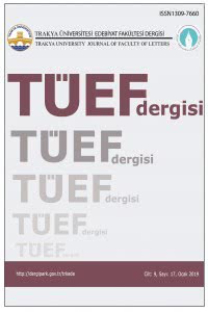KIŞ UYKUSU’NDA SIKINTI ÜZERİNE
Bu çalışmada, Nuri Bilge Ceylan’ın Kış Uykusu (2014) adlı filmini, sanatçının eserlerine
Anahtar Kelimeler:
Nuri Bilge Ceylan, Kış Uykusu, sıkıntı, sıkıntı felsefesi, Türk sineması, Türkiye’de modernleşme, sinema sosyolojisi, yavaş sinema
ON BOREDOM IN WINTER SLEEP
In this work, we focus on the film Winter Sleep (2014) by Nuri Bilge Ceylan, whose works place special emphasis on various aspects of boredom. As one of the main figures in slow cinema, Ceylan, in this influential work of art, enable us to explore boredom through three main characters: Aydın (Haluk Bilginer), Nihal (Melisa Sözen) and Necla (Demet Akbağ). By taking a closer look at the film, we analyze both symbolism and the behavioral side of boredom as well as how the main characters, in our view, experience and represent distinct types of boredom. In this framework, we examine the issue of boredom and, sometimes, related despair as a result of social change. At the same time, this work partly concentrates on aspects of the socio-cultural structure of Turkey via the analysis of the main characters’ suffering.
Keywords:
Nuri Bilge Ceylan, Winter Sleep, boredom, philosophy of boredom, Turkish cinema, modernization in Turkey, sociology of film, slow cinema,
___
- Ahmad, Feroz, The Making of Modern Turkey, Routledge, USA, 1993.
- Ahmad, Feroz, Turkey: The Quest for Identity, Oneworld, UK, 2014.
- Barbalet, Jack M., “Boredom and Social Meaning,” British Journal of Sociology, 50: 4, 1999, p. 631-646.
- Chekhov, Anton, Excellent People and Other Stories, Sovereign Classic, London, 2016.
- Çağlayan, Orhan Emre, Screening Boredom: The History and Aesthetics of Slow Cinema, University of Kent, Ph.D. thesis, Kent, 2014.
- De Luca, Tiago & George Nuno Barradas Jorge, (eds.) Slow Cinema, Edinburgh University Press, Edinburgh, 2016.
- Diken, Bülent, Laustsen, Carsten Bagge, Filmlerle Sosyoloji. trans. Ertekin. S., Metis, İstanbul, 2014.
- Doehlemann, Martin, Langeweile? Deutung eines verbreiteten Phänomens. Main, Frankfurt, 1991.
- Durudoğan, Hülya, “Namusun İlmiği,” [The Knot of Honour] in ed. Serpil Sancar, Birkaç Arpa Boyu... 21. Yüzyıla Girerken Türkiye’de Feminist Çalışmalar, [A Few Steps... Feminist Studies in Turkey in the 21st Century] Koc University Press, İstanbul, 2011.
- Erdal Aytekin, Pelin, “Nurı̇ Bilge Ceylan Sinemasının Anlatısal Dönüşümü: Fotografı̇k Anlatımdan, Öyküsel Anlatıma”, Selçuk İletişim. 9:1, 2015, pp. 247- 265.
- Fraser J. T., Haber, F. C., Müller, G. H., The Study of Time: Proceedings of the First Conference of the International Society for the Study of Time, Springer, New York, 1972.
- Gardiner, Michael E., “Henri Lefebvre and the ‘Sociology of Boredom’”, Theory, Culture & Society, 29: 2, 2012, p. 37-62.
- Gelgeç Bakacak, Ayla and Öktem, Pınar, “Homosexuality in Turkey: Strategies for Managing Heterosexism” Journal of Homosexuality, 61, 2014, p. 817-846.
- Göle, Nilüfer, Melez Desenler: İslam ve Modernlik Üzerine, Metis Yayınları, İstanbul, 2000.
- Kandiyoti, Deniz “Patterns of patriarchy: Notes for an analysis of male dominance in Turkish Society” In Şirin Tekeli (Ed.), Women in modern Turkish Society. London: Zed Books, 1995, pp. 306-319.
- Kenny, Lesley, Boredom Escapes Us: A Cultural Collage in Eleven Storeys, University of Toronto, PhD. Thesis, Toronto, 2009.
- Lowenstein, Adam, “Cinema, Benjamin, and the Allegorical Representation of September 11”, Critical Quarterly, 45: 1-2, 2003, pp. 73-84.
- Moran, Joe, “Benjamin and Boredom”, Critical Quarterly, 45: 1-2, 2003, pp. 168-181.
- Pease, Allison, Modernism, Feminism and the Culture of Boredom, Cambridge University Press, Cambridge, 2012.
- Roberts, J. T., Hite, A. B., Chorev, N., The Globalization and Development Reader, Blackwell, USA, 2007.
- Sancar, Serpil, Birkaç Arpa Boyu... 21. Yüzyıla Girerken Türkiye’de Feminist Çalışmalar, Koc University Press, İstanbul, 2011.
- Sayıcı, Fırat, 1990 Sonrası Türk Sinemasında Gerçekçilik. Konya Selçuk University, MA thesis, Konya, 2011.
- Selchov, S., “The Paths Not (Yet) Taken: Ulrich Beck, the ‘Cosmopolitized World’ and Security Studies,” Security Dialogue, 47: 5, 2016, pp. 369-385.
- Sennett, Richard, The Corrosion of Character: The Personal Consequences of Work in Late Capitalism, W. W. Norton & Company, London/New York, 1998.
- Svendsen, Lars, A Philosophy of Boredom, Reaktion Book, UK, 2005.
- Tokuroğlu, Belma, Özgürleşemeyen Kadın, Odak, Ankara, 2004.
- Yavuz, M. Hakan, “Turkish Identity and Foreign Policy in Flux: The Rise of Neo-Ottomanism”, Critique: Journal for Critical Studies of the Middle East, Spring, 1998, pp. 19-41.
- Waxman, Dov, “Islam and Turkish National Identity: A Reappraisal,” Turkish Yearbook of International Relations, 30, 2000, pp. 1-22.
- White, Jenny B., “State Feminism, Modernization, and the Turkish Republican Woman,” NWSA Journal, 15: 3, 2003, pp. 145-159.
- Zürcher, Eric J., Turkey: A Modern History, Tauris, London, 1993.
- ISSN: 1309-7660
- Yayın Aralığı: Yılda 2 Sayı
- Başlangıç: 2011
- Yayıncı: -
Sayıdaki Diğer Makaleler
AÇLIK OYUNLARINI KIM OYNUYOR: ARTEMIS MI PERSEFONI MI? SUZANNE COLLINS’IN ÜÇLEMESINDE PERSEFONI MITI
Fast Forwarding with Audiovisual Translation
CARLO GOLDONI VE LOKANTACI KADIN ADLI YAPITINDA TOPLUMSAL ÖGELER
ÇEVİRİ GÖSTERGEBİLİMİ EKSENİNDE ÖZGÜN METİN OKUMA VE ÇÖZÜMLEME MODELİ İLE ANLAM ARAYIŞI
KIŞ UYKUSU’NDA SIKINTI ÜZERİNE
Elif GEZGIN, Argun Abrek CANBOLAT
FAKRU’D-DEM TERİMİ VE KLASİK TÜRKÇE TIP METİNLERİNDEKİ EŞ ANLAMLILARI
